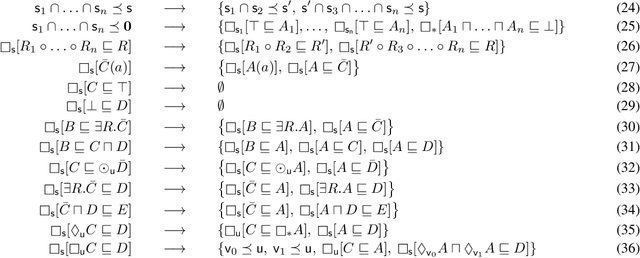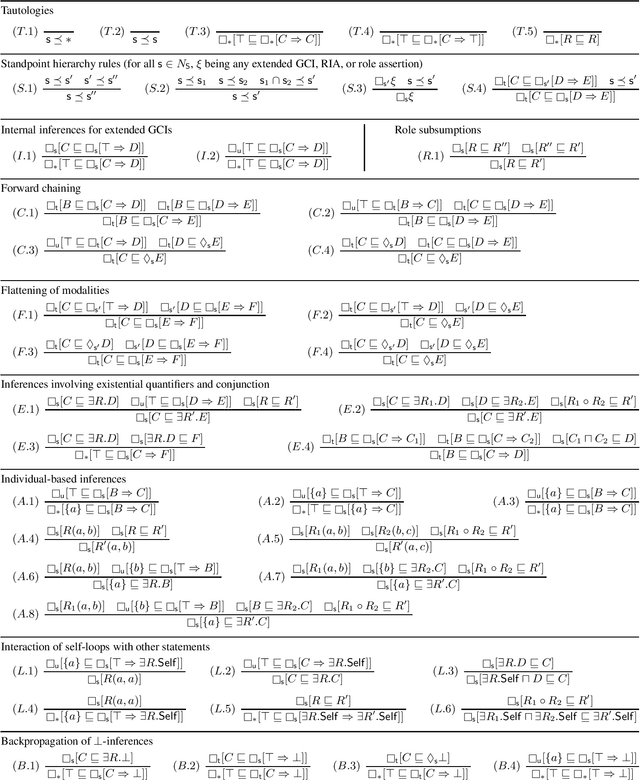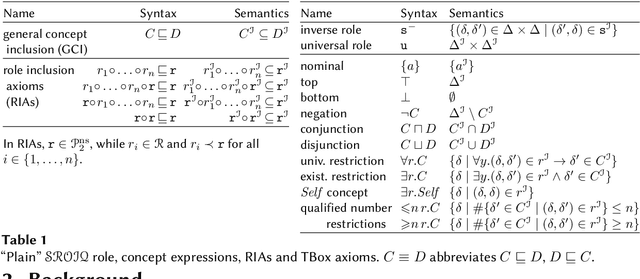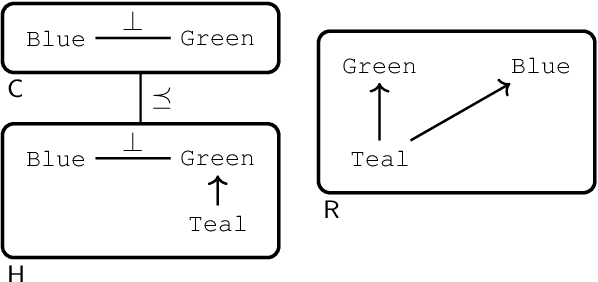Lucía Gómez Álvarez
Pushing the Boundaries of Tractable Multiperspective Reasoning: A Deduction Calculus for Standpoint EL+
May 11, 2023


Abstract:Standpoint EL is a multi-modal extension of the popular description logic EL that allows for the integrated representation of domain knowledge relative to diverse standpoints or perspectives. Advantageously, its satisfiability problem has recently been shown to be in PTime, making it a promising framework for large-scale knowledge integration. In this paper, we show that we can further push the expressivity of this formalism, arriving at an extended logic, called Standpoint EL+, which allows for axiom negation, role chain axioms, self-loops, and other features, while maintaining tractability. This is achieved by designing a satisfiability-checking deduction calculus, which at the same time addresses the need for practical algorithms. We demonstrate the feasibility of our calculus by presenting a prototypical Datalog implementation of its deduction rules.
Automated reasoning support for Standpoint-OWL 2
Apr 30, 2023
Abstract:We present a tool for modelling and reasoning with knowledge from various diverse (and possibly conflicting) viewpoints. The theoretical underpinnings are provided by enhancing base logics by standpoints according to a recently introduced formalism that we also recall. The tool works by translating the standpoint-enhanced version of the description logic SROIQ to its plain (i.e. classical) version. Existing reasoners can then be directly used to provide automated support for reasoning about diverse standpoints.
Vagueness in Predicates and Objects
Feb 25, 2023

Abstract:Classical semantics assumes that one can model reference, predication and quantification with respect to a fixed domain of precise referent objects. Non-logical terms and quantification are then interpreted directly in terms of elements and subsets of this domain. We explore ways to generalise this classical picture of precise predicates and objects to account for variability of meaning due to factors such as vagueness, context and diversity of definitions or opinions. Both names and predicative expressions can be given either multiple semantic referents or be associated with semantic referents that incorporate some model of variability. We present a semantic framework, Variable Reference Semantics, that can accommodate several modes of variability in relation to both predicates and objects.
Tractable Diversity: Scalable Multiperspective Ontology Management via Standpoint EL
Feb 25, 2023Abstract:The tractability of the lightweight description logic EL has allowed for the construction of large and widely used ontologies that support semantic interoperability. However, comprehensive domains with a broad user base are often at odds with strong axiomatisations otherwise useful for inferencing, since these are usually context-dependent and subject to diverging perspectives. In this paper we introduce Standpoint EL, a multi-modal extension of EL that allows for the integrated representation of domain knowledge relative to diverse, possibly conflicting standpoints (or contexts), which can be hierarchically organised and put in relation to each other. We establish that Standpoint EL still exhibits EL's favourable PTime standard reasoning, whereas introducing additional features like empty standpoints, rigid roles, and nominals makes standard reasoning tasks intractable.
How to Agree to Disagree: Managing Ontological Perspectives using Standpoint Logic
Jun 14, 2022
Abstract:The importance of taking individual, potentially conflicting perspectives into account when dealing with knowledge has been widely recognised. Many existing ontology management approaches fully merge knowledge perspectives, which may require weakening in order to maintain consistency; others represent the distinct views in an entirely detached way. As an alternative, we propose Standpoint Logic, a simple, yet versatile multi-modal logic ``add-on'' for existing KR languages intended for the integrated representation of domain knowledge relative to diverse, possibly conflicting standpoints, which can be hierarchically organised, combined and put in relation to each other. Starting from the generic framework of First-Order Standpoint Logic (FOSL), we subsequently focus our attention on the fragment of sentential formulas, for which we provide a polytime translation into the standpoint-free version. This result yields decidability and favourable complexities for a variety of highly expressive decidable fragments of first-order logic. Using some elaborate encoding tricks, we then establish a similar translation for the very expressive description logic SROIQb_s underlying the OWL 2 DL ontology language. By virtue of this result, existing highly optimised OWL reasoners can be used to provide practical reasoning support for ontology languages extended by standpoint modelling.
Automating Reasoning with Standpoint Logic via Nested Sequents
May 05, 2022


Abstract:Standpoint logic is a recently proposed formalism in the context of knowledge integration, which advocates a multi-perspective approach permitting reasoning with a selection of diverse and possibly conflicting standpoints rather than forcing their unification. In this paper, we introduce nested sequent calculi for propositional standpoint logics--proof systems that manipulate trees whose nodes are multisets of formulae--and show how to automate standpoint reasoning by means of non-deterministic proof-search algorithms. To obtain worst-case complexity-optimal proof-search, we introduce a novel technique in the context of nested sequents, referred to as "coloring," which consists of taking a formula as input, guessing a certain coloring of its subformulae, and then running proof-search in a nested sequent calculus on the colored input. Our technique lets us decide the validity of standpoint formulae in CoNP since proof-search only produces a partial proof relative to each permitted coloring of the input. We show how all partial proofs can be fused together to construct a complete proof when the input is valid, and how certain partial proofs can be transformed into a counter-model when the input is invalid. These "certificates" (i.e. proofs and counter-models) serve as explanations of the (in)validity of the input.
 Add to Chrome
Add to Chrome Add to Firefox
Add to Firefox Add to Edge
Add to Edge